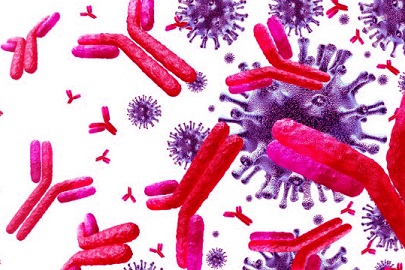Nikhil Prasad Fact checked by:Thailand Medical News Team Sep 20, 2024 1 year, 3 months, 1 week, 5 days, 9 hours, 47 minutes ago
Medical News: A Closer Look at COVID-19’s Immunity
In a groundbreaking study led by a team of researchers from Osaka University, Japan, scientists have shed light on the clonal expansion of autoantibody-secreting plasmablasts in patients with severe COVID-19. The researchers examined how the body’s immune response, particularly through the generation of autoantibodies, plays a role in the progression of COVID-19, potentially contributing to the severity of symptoms in some patients.
 New findings on plasmablasts and autoantibodies in COVID-19
New findings on plasmablasts and autoantibodies in COVID-19
Their research delves into how these autoantibodies, produced by plasmablasts, not only target viral proteins like SARS-CoV-2 but also cross-react with the body’s own tissues, potentially exacerbating the disease. This
Medical News report offers insights into the origins of these autoantibodies, their impact on COVID-19 severity, and what it might mean for future treatments of severe viral infections.
Autoantibodies and Their Role in COVID-19
Autoantibodies are a class of antibodies that mistakenly target the body’s own tissues, leading to autoimmune diseases. In the case of COVID-19, it has been noted that patients suffering from severe forms of the disease often have elevated levels of autoantibodies. However, the mechanism behind their generation remained unclear until now.
The study team analyzed the immune responses of COVID-19 patients, particularly focusing on plasmablast-derived monoclonal antibodies (mAbs). Th study explores how these antibodies are produced and the underlying reasons why they develop in severe cases of COVID-19.
Their findings suggest that the body’s immune response to SARS-CoV-2 triggers the production of autoantibodies through a complex process involving clonal expansion, somatic hypermutation, and viral antigen-driven selection.
The Study Design: Investigating Severe COVID-19 Patients
The team from Osaka University, including scientists from the Immunology Frontier Research Center and the Center for Infectious Disease Education and Research, selected a group of severe COVID-19 patients admitted to intensive care units (ICUs). Blood samples were collected from these patients to analyze the antibody responses at a clonal level. By using immunoglobulin repertoire analysis and sequencing techniques, the researchers were able to identify the clonal landscape of the plasmablasts responsible for producing these autoantibodies.
A total of 123 mAbs were generated from COVID-19 ICU patients, and for comparison, 66 mAbs were generated from healthy donors who had received the COVID-19 vaccine. Among the patient-derived mAbs, 22% showed reactivity to SARS-CoV-2 antigens, while 23% of vaccine-induced antibodies were found to target the virus.
The antibodies were primarily of the IgG1 and IgA1 subclasses, and a significant proportion of these antibodies were cross-reactive, meaning they targeted both viral proteins and the body’s own tissues, such as cardiolipin (CL).
Key Findings: Autoantibodies Reacting to Both Virus and Self
One of the study's most striking findings was the identification of plasmablast clones that were reactive to both viral and self-antigens. Approximately 16% of the COVID-19 patient-derived mAbs were found to react with CL, a phospholipid that plays a key role in blood clotting and cell membrane structure. This is a crucial finding, as it suggests that the autoantibodies generated during severe COVID-19 may contribute to the observed coagulopathy (abnormal blood clotting) seen in many critically ill patients.
Further analysis revealed that these autoantibodies were not restricted to reacting with CL. Many also reacted with other phospholipids and even the nucleoli of human cells. Notably, some of these autoantibodies shared genetic features with antibodies found in patients with autoimmune diseases like lupus, where similar autoantibodies are produced.
Moreover, several of the autoantibody clones showed signs of somatic hypermutation, a process by which B cells rapidly evolve to improve their ability to bind to antigens. This finding suggests that these autoantibodies may have undergone selection and evolution during the immune response to SARS-CoV-2, acquiring the ability to bind to both viral and self-antigens.
Public Autoantibodies: A Unique Discovery
A particularly intriguing discovery from this research was the identification of a novel “public” autoantibody, named PA-N-CoV1804. Public antibodies are antibodies that are shared by multiple individuals and have a highly conserved genetic structure. The PA-N-CoV1804 antibody was found to be reactive to both SARS-CoV-2’s nucleocapsid protein (N) and the body’s own CL, making it a key player in the immune response of severe COVID-19 patients.
What makes this finding particularly important is that public autoantibodies are relatively uncommon. Their presence in multiple patients suggests that there may be a common immune pathway triggered by SARS-CoV-2 infection that leads to the production of these autoantibodies.
Conclusion: What This Means for COVID-19 and Beyond
This research offers critical insights into the role of autoantibodies in the progression of COVID-19, especially in patients who experience severe symptoms. The discovery of autoantibodies that target both viral and self-antigens suggests that SARS-CoV-2 not only triggers a robust antiviral immune response but also activates immune pathways that lead to autoimmunity.
The implications of this study extend beyond COVID-19. Autoantibody production has been associated with other viral infections, and understanding the mechanisms behind their generation could help scientists develop treatments for autoimmune diseases triggered by viral infections. In the case of COVID-19, therapies aimed at reducing the production of autoantibodies could potentially alleviate some of the severe complications associated with the disease, such as coagulopathy.
The study also opens up new avenues of research into public autoantibodies like PA-N-CoV1804, which could serve as potential targets for therapeutic interventions in COVID-19 and other diseases where autoantibodies play a role.
The study findings were published in the peer-reviewed journal: Life Science Alliance.
https://www.life-science-alliance.org/content/7/12/e202402774
For the latest COVID-19 News, keep on logging to Thailand
Medical News.
Read Also:
https://www.thailandmedical.news/news/new-study-reveals-the-role-of-autoantibodies-in-post-covid-19-vaccination-syndrome
https://www.thailandmedical.news/news/study-shows-insights-of-nuanced-interactions-between-autoantibodies-and-specific-covid-19-symptoms-with-anti-agtr1-antibodies-playing-a-key-role
https://www.thailandmedical.news/news/breaking-covid-19-news-european-study-shockingly-finds-that-sars-cov-2-causes-babies-to-develop-islet-autoantibodies
